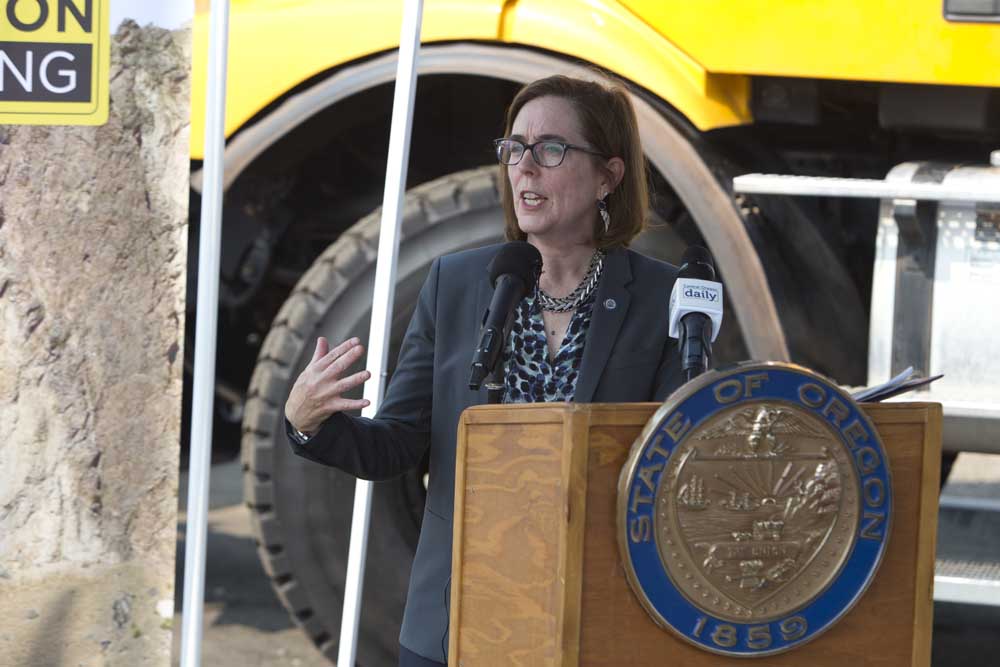Editorial: Brown’s irresponsible goal of a hurry-up carbon tax
Published 6:30 am Monday, September 18, 2017

- Oregon Governor, Kate Brown, speaks to a group of people in Bend August 28, 2017. (Andy Tullis/Bulletin photo)
Gov. Kate Brown said earlier this summer that she wants to use the short 2018 legislative session to pass a carbon tax for Oregon.
Trying to impose a momentous change on the state in barely over a month — on top of all the other bills that the Legislature will be considering — invites a monumental policy flop. It could make the $300 million Cover Oregon boondoggle look teeny.
A carbon tax basically puts a price on carbon. Emitters have to pay. It’s not clear what form that might take in 2018. One clue is Senate Bill 1070, which was introduced and died in the 2017 session. It required big emitters to pay a carbon tax and then reinvested the tax revenue — perhaps $700 million a year — to reduce the use of carbon and create jobs.
The $700 million wasn’t free. Oregonians would be paying for it by paying more for groceries, health care, heating and to get to work.
Many environmentalists love carbon taxes. Some economists do, too. The love from environmentalists is easy to understand. But the love from economists deserves explanation.
Economists who love carbon taxes love them because they are clearly visible and can reduce layers of regulation. If a society is going to have carbon regulation, it makes a lot more sense to have a visible tax than what government pushes now — a complex regulatory network with tax benefits for energy-efficient schools, ethanol, solar, Teslas, windmills and so on. The complex regulatory network creates a complex government bureaucracy to manage it and an army of lawyers, accountants and more in business to attempt to understand it and seek loopholes.
This kind of regulation is a government-sponsored reward system for special interests. Some politicians and environmentalists like that, because they can pick their favorites and bestow the government’s blessing upon them. They can use it to tell people how they should live.
Taxing carbon isn’t simple, but it should be simpler. So even economists who are skeptical about climate change argue that if a government is going to fritter away money, it’s more efficient to do it with a tax than with a complex regulatory network.
One inescapable flaw is that it only would be simpler and a possible improvement if government removed the complex regulatory network and replaced it with the simpler carbon tax. Don’t bet for a second that Oregon lawmakers could do that — no matter how much time they spent in Salem. Much of the environmental regulation is federal.
Oregon’s state government does do some things well. But when given a chance to incentivize green energy projects, it has shown a bewildering aptitude for wasting state money. The state had to kill its business energy tax credit program to stop the rot. And that is not the only example. Oregonians are supposed to hand the state $700 million with that track record? No thank you.
There is also a danger that the way a carbon tax impacts consumers will create incentives unfair to the poor, middle class or rural Oregonians. It’s easier for the rich to buy a nice electric car. It’s easier for the rich to upgrade to more efficient heating systems or install solar panels. Paying for a carbon tax could be an enormous new burden for everyone else.
There’s hardly need to point out more possible problems, but a carbon tax will undoubtedly make the state less competitive location for business. Some businesses may benefit. But unless other states adopt similar policies, Oregon is likely to pay the price for going it alone.
We can imagine Brown and some legislators getting excited about Oregon leading the way with a carbon tax and drooling over hundreds of millions in new revenue to spend on their favorite projects. But the Legislature’s short sessions were never intended to take on issues of such comprehensive, dramatic and problematic change.






